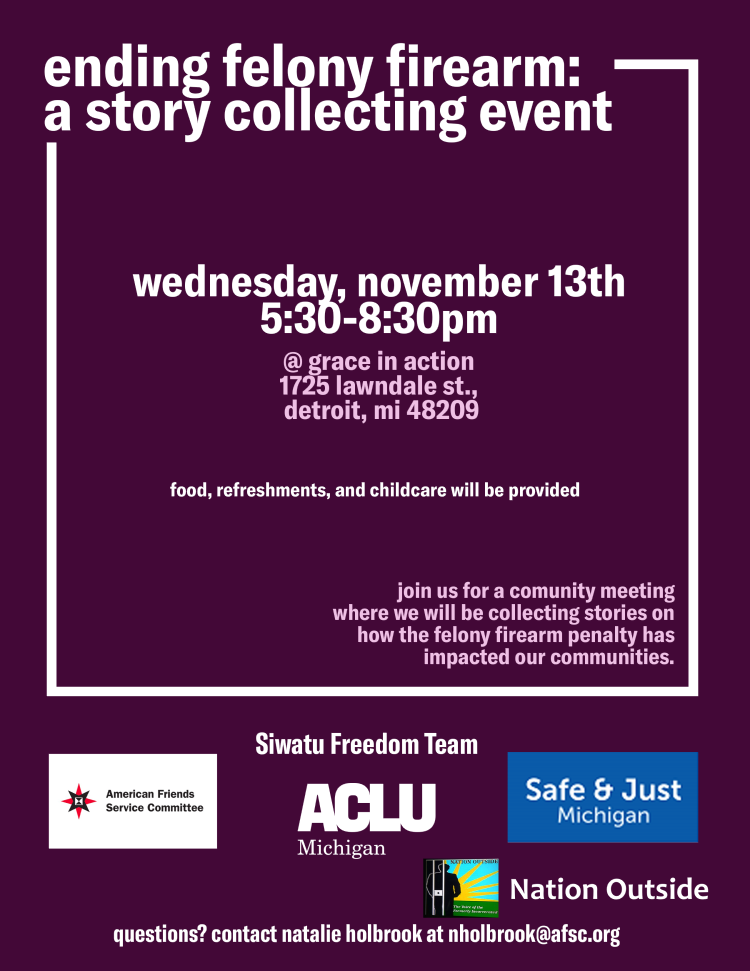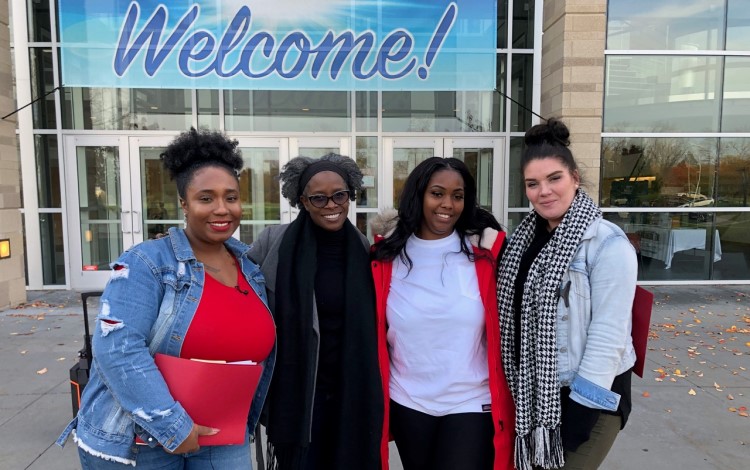Hello Friends,
We’re back again with the AFSC Michigan Criminal Justice Program's Biweekly Newsletter. We have done an enormous amount of collaboration and strategy work in the past couple of weeks, as well as answered over 100 letters (this means deep advocacy on many of these cases), and continued work on some of the hardest cases throughout Michigan’s prisons.
The following is our Program Update for 10/25-11/12:
Ending Felony Firearm: a story collection dinner & event
What: Dinner, Community Conversation, and Story Collection event on Ending Mandatory Felony Firearm Excessive Punishment sentences
When: November 13, 2019 from 5:30 to 8:30
Where: Grace in Action, 1725 Lawndale, Detroit, MI 48209

Food and Childcare provided!
Please join the Siwatu Freedom Team, AFSC-MI, ACLU-MI, Safe & Just MI, Nation Outside, and folks impacted by the criminal justice system for an evening of learning and sharing. On November 13th, from 5:30 to 8:30 we will hold a public education, community conversation, and story collection event on the issue of Mandatory Felony Firearm Excessive Punishment sentences. We want to hear from people who have experienced this excessive punishment directly and people who love people who have experienced this punishment directly. We also want to hear from community members about how we can work together to create safety and liberation for all without using prisons and jails to solve harm. Contact Natalie for more info: nholbrook@afsc.org.

L to R Siwatu, Senator Geiss, Miesha, and Ashley
Collaborative Work to Address Intersections of Pregnancy, Incarceration, and Conditions at the Women's Prison
Advocacy and Legislative Work
AFSC has been working closely with the Siwatu Freedom Team, and other organizations, advocating for improvements in the care of/ conditions of confinement for incarcerated people who are pregnant, incarcerated caregivers of children, and women in prison in general. Most recently, direct advocacy from this collaborative resulted in an amendment added to the 2019 budget bill which allows for a family member to be present while women are in labor and after they give birth. This is a huge step forward in the continuity of care for both birthing people and infants.
AFSC and the Siwatu Freedom Team are holding a series of meetings with State Senator Erika Geiss and her team to develop talking points and messaging, listen to stories of directly affected people, and map a sound plan for garnering support and visibility around these issues. The first of these stakeholder meetings was held at Wayne County Community College on Friday November 1st, attended by stakeholders from three women who gave birth inside, the AFSC, the Michigan Prison Doula Initiative, Siwatu Freedom Team, St. Joseph Mercy, University of Michigan, Mothering Justice, Engage Michigan, and the Prison Birth Project.
We listened to mamas tell their stories, talked about legislative fixes, the legislative process, and discussed messaging and talking points. The group came away energized to create lasting change for women who are pregnant or postpartum and incarcerated. Our next Stakeholder Meeting will be November 18 at 3:30. We will meet in person at AFSC's office 124 Pearl, Suite 607, Ypsilanti, MI 48197 and provide a working ZOOM for those who cannot be there in person. More info: nholbrook@afsc.org
Diversion Program for Pregnant and Postpartum People
Because we know prisons are not conducive to healing and only cause more harm to individuals and communities, we must work toward larger change that envisions a world without prisons. AFSC, Detroit Justice Center, and Moms Beyond Bars have continued work on a diversion model which would keep pregnant people out of prison, jail, or youth homes. Most recently, these organizations developed a steering team with directly impacted people, academics, health care providers, reps from children and family services, public health, women’s health, and experts in substance use disorder. We held a meeting at Wayne State University on Monday, October 28th to develop a strategic plan for a program in Michigan which would act as an alternative to incarceration for people who are pregnant, postpartum, or the caregivers of young children. If you would like notes from this meeting or to request a place on the steering committee, please email Jacqueline Williams at jwilliams@afsc.org.
Addressing Long Term Segregation in Michigan’s Prisons
AFSC has long been a leader in the fight to abolish long-term segregation within Michigan’s prisons. Two years ago, we began reaching out to men stuck at a prison in the Upper Peninsula, Baraga Maximum Facility, who were housed in segregation and past their earliest release dates (ERDs). We have continued correspondence with many of those men, facilitating accountability and healing work, addressing conditions with the Department of Corrections, and encouraging alternatives to the torturous practice of segregation. Several of the men we’ve worked with are now on parole, and others have worked their way down in levels and are preparing for release. Others, still, are stuck in the cycle of high levels and segregation, and we continue to work with them—and many more folks from Chippewa, Ionia, and other Max facilities—to reduce their levels and be let out of the box. A case example of the work we have done is as follows:
DeQuan Harris spent the majority of his incarceration at a Level II until he was convicted on a new charge for attempted prisoner possessing weapons. After that, he began to spiral, got caught in a cycle of depression, acting out, and becoming enraged whenever a correctional officer would challenge him. He then spent four years in and out of level five and segregation. We reached out to him in September 2017 when he was already two years past his ERD, and he was ready for help to stop the cycle.
With renewed focus, Mr. Harris worked through the Personal Enrichment and Parole Readiness curriculums, diligently participated in a co-mentorship with one of our staff, began a step-down program, completed all of his mandatory classes (and more) and went 14 months ticket free, finally landing back at level two. Mr. Harris is up to see the parole board next month, and we have already sent our letter to the board on his behalf. We look forward to watching Mr. Harris continue his progress outside of prison.
Good Neighbor Project
Program Associate Demetrius Titus has been traversing the state and holding large discussions on the Good Neighbor Project, our co-mentorship program between free-world people and those serving long time in MDOC. Most recently, Demetrius, Daniel Jones and his co-mentor Erin Bartels gave a presentation to a packed house at Michigan State University, rustling up 26 new sign-ups for the project and demonstrating first-hand what profound effects can occur when we reach across the barbed wire and find the humanity in one another.